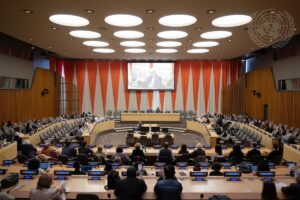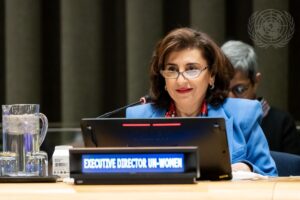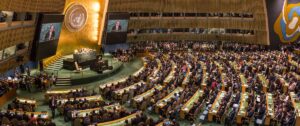Executive Summary
The world today is widely seen as split, perilous, and darkening, which this survey underlines. Yet while these findings are cause for concern, they also contain reasons for hope: a broad awareness of global problems and a willingness to consider answers. The Global Governance Survey shows a broad swathe of the global public responsive to issues facing the whole world, not just their own countries.
The Global Governance Survey explores attitudes on key global issues and potential solutions across leading countries in the developed and developing worlds. It was conducted online in 12 countries from January 27 to February 28, 2023, with a total sample of 4,800. Representative samples of 400 per country were drawn from adult citizens of the Group of Seven (the U.S., Canada, U.K., France, Germany, Italy, and Japan), and the BRICS (Brazil, Russia, India, China, and South Africa). Full details are in the Methodology Appendix.
This unique survey reveals a surprising and substantial degree of consensus on major global issues across the nations polled. It shows unexpected similarities on responses on war, peace, and conflict resolution among people in almost all G7 and BRICS countries, including a hostility to aggression and a willingness to penalize it. The consequences of the COVID-19 pandemic have forged a shared commitment to avoiding a repetition and promoting health care for all. On climate issues, the long-term result of advocacy, leadership, and disasters is a readiness to back major initiatives to respond to the crisis. There is also a willingness to fill in gaps in international institutions—such as the lack of an international anti-corruption court, making the Security Council more inclusive, or connecting UN bodies to other stakeholders, including parliamentarians.
Key findings include:
Part I
Megatrends: The Global Mood: Divided, Dangerous, and Worsening
- “Divided,” “dangerous,” and “worsening” are the most frequent descriptions of the state of the world.
- The general view is that the world is headed in the wrong direction, and worry is widespread.
- There is particular concern about conflict, economics, and corruption.
- Discontent is also widespread on climate, rights, governance, resources, and cooperation; COVID-19 and refugees are the only issues where most say the world is doing well.
- On most global issues, the world is seen as doing worse than a decade ago.
- The respondents in the BRICS (Brazil, Russia, India, China, and South Africa) countries and the young are more optimistic on global issues.
Part II
International Peace and Security: Hostility to Aggression, Support for International Law
- There is broad support for strong international responses to aggression, including non-recognition of territorial conquest, economic sanctions, and reparations from aggressors.
- International consequences for Russian aggression are favored by citizens elsewhere, even where governments have taken neutral stances or leaned toward Russia during the Ukrainian war.
- War crimes should include attacks on power grids, rape and sexual violence, and the use of autonomous killer drones, in the view of large majorities.
- Most people say their countries should cooperate in bringing war crimes suspects to the International Criminal Court in every country polled, except Russia.
- A greater role for international courts and arbitration in dispute resolution is massively favored.
Part III
Pandemic Response and Socio-Economic Development: Progress and Support for Action
- The vast majority of adults in the G7 and BRICS countries have received vaccination against COVID-19, and nearly half had the disease, so almost all have some immunity to it.
- The survey reveals general satisfaction with national COVID-19 vaccination and treatment programs, as well as broad if lesser approval of countries’ economic and social recovery efforts from the disease.
- There is extensive support polled for measures to prevent future pandemics, including boosting World Health Organization authority, funding, and factories for vaccines, as well as early warning systems.
- There is also broad support for public-private partnerships to promote Universal Health Care.
Part IV
Environmental Governance and Climate Action: A Broad Consensus for Change
- The Paris Climate Accord is known to majorities in most countries polled, and almost half of the publics have heard of the Conference of Parties (COP) 27.
- Opinions are split on whether voluntary national pledges, as recommended in the Paris Climate Accord, or mandatory carbon emissions limits are the best way to encourage countries to reduce their emissions.
- Compensation from a Loss and Damage fund for global warming damage in developing countries, adopted, in principle, at COP 27 draws substantial support but also considerable uncertainty.
- Policy measures to encourage, require, or punish failure on climate action are favored by large majorities of the respondents polled.
Part V
The Rule of Law and Inclusive International Governance: Readiness for Bold Measures
- Most respondents favor the creation of an international anti-corruption court for cases which national tribunals are unable to handle.
- Substantial majorities view the United Nations and Group of 20 (G20) favorably.
- Sentiment broadly favors making the Security Council more inclusive by adding Brazil, India, and South Africa as permanent members and limiting permanent members’ use of the veto.
- Better connecting international bodies, through G20/General Assembly economic summits and an international UN parliamentary network, gets a favorable reception.
Part VI
Global Leadership, Collective Action, and Citizenship: Multilateralism and a Shared Identity
- There is a widely shared preference for multilateral leadership to deal with security, climate, pandemic, and human rights issues.
- The majority of respondents consider themselves global citizens, but this perspective is more common in the G7 countries than in the BRICS.
- Humanity represents a common bond: in every country polled, the prevailing view is that they would help even their worst enemy fight an (imagined) invasion by aliens from outer space.
Conclusion
- Overall, support for strengthening global governance is widespread in the survey countries.
- Attitudes on global citizenship, COVID-19 vaccination, and cosmopolitanism strongly correlate with support for more effective global governance.
- The public is ahead of their leaders on global governance innovation and strengthening.
In short, the survey reveals a shared readiness for action on global governance across the divides of North versus South or East versus West. Collective action and multilateral institutions are seen as the best ways to advance the common interests of citizens in all nations, whether on conflict, rights, climate, or health. People feel they are stakeholders in a connected world, not just individual countries. There is a sense of global citizenship and an awareness of a common humanity which underly these beliefs. The Global Governance Survey shows that there is an option besides an anarchic world beset by war and crisis. It is a positive, hopeful, and truly global vision that the peoples of leading nations are ready to support, if their leaders can find a willingness to embrace it.




